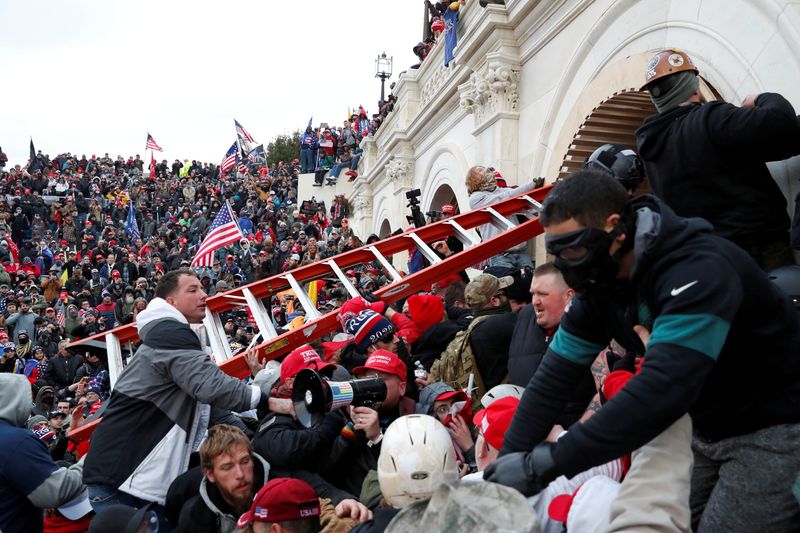By John Kruzel and Andrew Chung
WASHINGTON (Reuters) – The U.S. Supreme Court on Tuesday considers a Pennsylvania man’s bid to avoid an obstruction charge related to the Jan. 6, 2021, attack on the Capitol – a case with possible implications for the federal prosecution of Donald Trump for his efforts to overturn his 2020 election loss.
The justices are set to hear arguments in Joseph Fischer’s appeal of a lower court’s ruling rejecting his attempt to escape a federal charge of corruptly obstructing an official proceeding – the congressional certification of President Joe Biden‘s victory over Trump that the rioters sought to prevent. The arguments are set for 10 a.m. ET (1400 GMT).
Trump faces the same charge in a criminal case brought against him last year by Special Counsel Jack Smith.
Fischer’s lawyers have argued for a narrow application of the obstruction charge – only against defendants who tampered with evidence. A Supreme Court ruling dismissing the charge against Fischer could make it more complicated – but not impossible – to make the charge stick against Trump, according to experts.
The charge carries a sentence of up to 20 years in prison, though Jan. 6 defendants convicted of obstruction have received far lesser sentences. Federal prosecutors have brought obstruction charges against about 350 of the roughly 1,400 people charged in the Capitol attack.
The Supreme Court next week confronts another major case involving Trump, the Republican candidate challenging the Democratic president in the Nov. 5 U.S. election in a 2020 rematch. The justices will hear arguments on April 25 in Trump’s assertion of presidential immunity from prosecution in the election subversion case brought against him by Smith.
Fischer is awaiting trial on six other criminal counts, including assaulting or impeding officers and civil disorder, while he challenges his obstruction charge at the Supreme Court.
According to prosecutors, Fischer charged at police officers guarding a Capitol entrance during the attack. Fischer, at the time a member of the North Cornwall Township police in Pennsylvania, got inside and pressed up against an officer’s riot shield as police attempted to clear rioters. He remained in the building for four minutes before police pushed him out.
U.S. District Judge Carl Nichols, a Trump appointee, dismissed Fischer’s obstruction charge, ruling that it applies only to defendants who tampered with evidence. The U.S. Court of Appeals for the District of Columbia Circuit reversed that decision, finding that the law under which the charge was brought was not limited to documents and records, instead applying “to all forms of corrupt obstruction of an official proceeding.”
After the 2020 election, Trump and his allies made false claims that it had been stolen from him through widespread voting fraud. On the day when Congress met to certify Biden’s victory, Trump supporters stormed the Capitol, broke through barricades, attacked police officers, vandalized the building and forced lawmakers and others to flee for safety.
In August 2023, Smith brought four federal criminal counts against Trump: conspiring to defraud the United States, corruptly obstructing an official proceeding and conspiring to do so, and conspiring against the right of Americans to vote. Smith has separately charged Trump in a case involving the retention of classified documents after leaving office.
Trump faces two other criminal cases as well. He has pleaded not guilty in all the case and called them politically motivated.
(Reporting by John Kruzel and Andrew Chung; Editing by Will Dunham)
